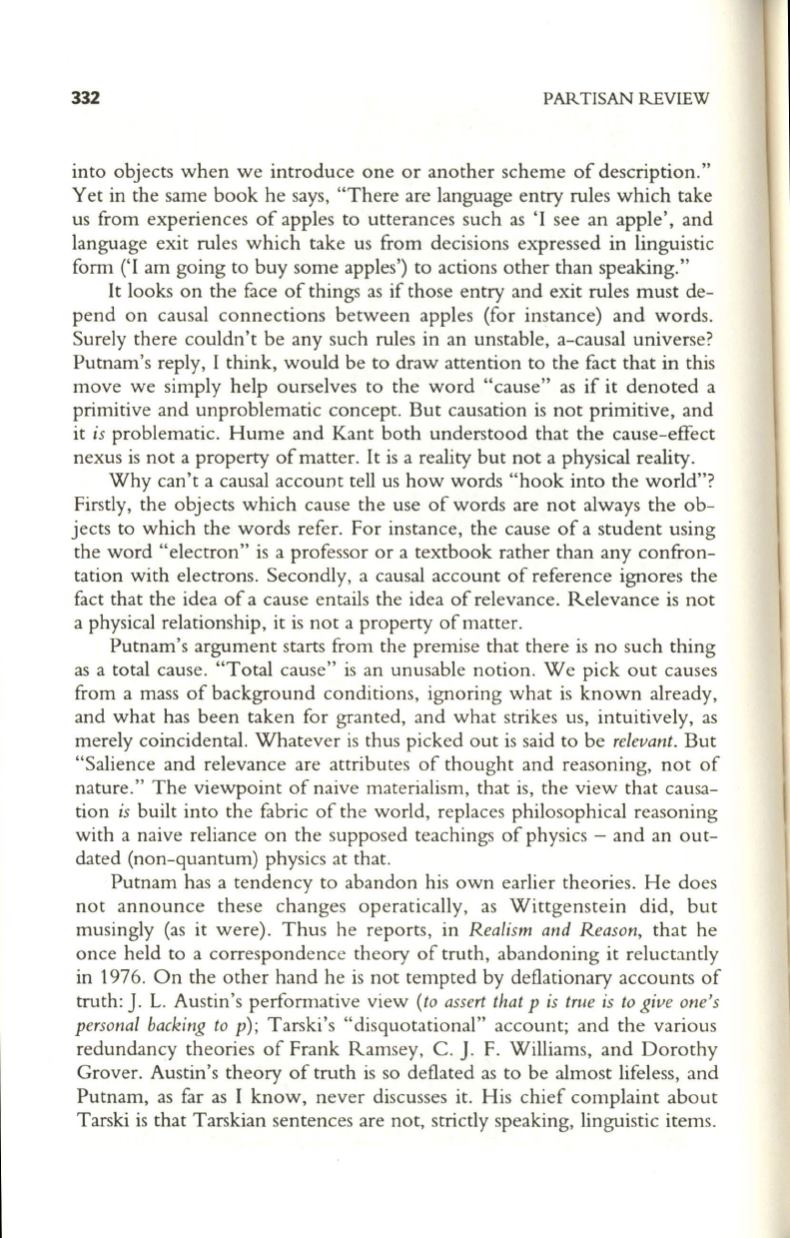
332
PARTISAN REVIEW
into objects when we introduce one or another scheme of description."
Yet in the same book he says, "There are language entry rules which take
us from experiences of apples to utterances such as 'I see an apple', and
language exit rules which take us from decisions expressed in linguistic
form ('I am going to buy some apples') to actions other than speaking."
It looks on the face of things as if those entry and exit rules must de–
pend on causal connections between apples (for instance) and words.
Surely there couldn't be any such rules in an unstable, a-causal universe?
Putnam's reply, I think, would be to draw attention to the fact that in this
move we simply help ourselves to the word "cause" as if it denoted a
primitive and unproblematic concept. But causation is not primitive, and
it is problematic. Hume and Kant both understood that the cause-effect
nexus is not a property of matter. It is a reality but not a physical reality.
Why can't a causal account tell us how words "hook into the world"?
Firstly, the objects which cause the use of words are not always the ob–
jects to which the words refer. For instance, the cause of a student using
the word "electron" is a professor or a textbook rather than any confron–
tation with electrons. Secondly, a causal account of reference ignores the
fact that the idea of a cause entails the idea of relevance. Relevance is not
a physical relationship, it is not a property of matter.
Putnam's argument starts from the premise that there is no such thing
as a total cause. "Total cause" is an unusable notion. We pick out causes
from a mass of background conditions, ignoring what is known already,
and what has been taken for granted, and what strikes us, intuitively, as
merely coincidental. Whatever is thus picked out is said to be
relevant.
But
"Salience and relevance are attributes of thought and reasoning, not of
nature." The viewpoint of naive materialism, that is, the view that causa–
tion is built into the fabric of the world, replaces philosophical reasoning
with a naive reliance on the supposed teachings of physics - and an out–
dated (non-quantum) physics at that.
Putnam has a tendency to abandon his own earlier theories. He does
not announce these changes operatically, as Wittgenstein did, but
musingly (as it were). Thus he reports, in
Realism and Reason,
that he
once held to a correspondence theory of truth, abandoning it reluctantly
in 1976. On the other hand he is not tempted by deflationary accounts of
truth:
J.
L.
Austin's performative view
(to assert that p
is
true
is
to give one's
personal backing to p);
Tarski's "disquotational" account; and the various
redundancy theories of Frank Ramsey,
C.
J.
F. Williams, and Dorothy
Grover. Austin's theory of truth is so deflated as to be almost lifeless, and
Putnam, as far as I know, never discusses it. His chief complaint about
Tarski is that Tarskian sentences are not, strictly speaking, linguistic items.


